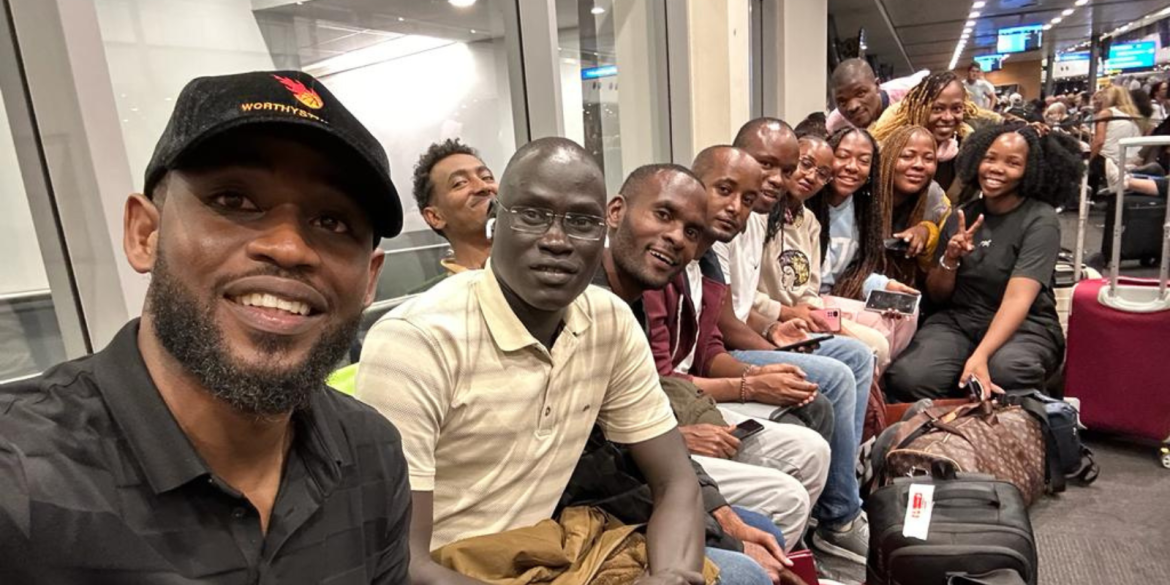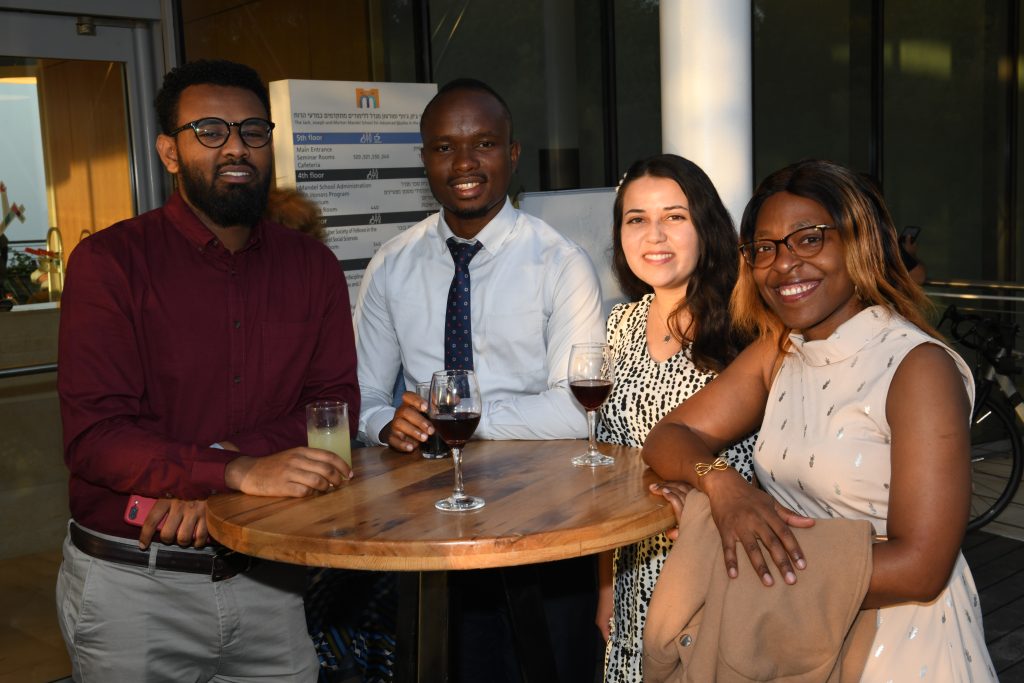
When the war broke out in October 2023, just days before the original start date of the academic year, some students from the 49th cohort of the IMPH programme—many of them from Africa—were en route to Israel. However, with the closure of the skies and airlines ceasing flights to the country, the students had no choice but to return to their home countries. One student, unable to cancel her flight, eventually arrived in Israel but, under pressure from her family, returned after a few days. Recognising the magnitude of the challenge, Professor Hagit Hochner, Director of the IMPH programme at the Braun School of Public Health and Community Medicine at the Hebrew University, began taking action on Saturday afternoon to prevent the remaining students from arriving, even before an official decision was made to postpone the academic year, originally scheduled to begin on 15 October.
The IMPH programme is unique, with the vast majority of students coming from abroad, most of them already doctors seeking to enhance their profession and contribute to global betterment, particularly in developing countries. For those enrolled in the programme, it meant taking a break from their professional lives to study in another country. Thus, when the decision was made to postpone the start of the academic year, most students found themselves without occupation and were concerned about rumours suggesting the academic year might be cancelled. “I had already resigned from my job. The challenge was that I couldn’t return to work because I didn’t know how long I would have to wait until the studies started—whether for a week, a month, or two. I was just waiting at home, and it was difficult not being able to work, especially since I had resigned just one week before my departure,” said Paola Ines Kwawa, an IMPH student from Cameroon.
Consequently, the programme administration decided to act swiftly and officially opened the academic year a week later, holding classes via Zoom. “It was somewhat challenging due to the time differences; some did not have good internet access, and since some were doctors still in their home countries, they had to return to work and therefore could not fully commit to their studies,” said Professor Hochner. “So we started discussions on what to do. We held many consultations with both the students and the faculty and university administration, and ultimately, midway through the semester, we received special permission to resume in-person classes. We were the first programme at the Hebrew University, and probably in Israel, to do so.”
“Thanks to the support of BFHU’s supporters, against all odds, we managed to book ticket flights from Johannesburg at no cost to the students. The students travelled to Johannesburg from their respective locations, and until the last moment, even at the terminal gate, they did not know if their flight would depart on time or even be able to land. In the end, the plane took off, and on the morning of Monday, 20 November 2023, twelve students landed in Israel. In the following days, a few more students arrived from other parts of the world, and classes resumed on campus”.
In Israel, the programme administration ensured the students’ safety. The classes take place at Hadassah Hospital in Ein Kerem, which is a very secure campus. Their classrooms are like shelters, and their dorms are within Hadassah. “We guaranteed that we would build an infrastructure to assure their safety and well-being.”
In January 2024, shortly after the official start of the academic year at the university, we met with three of the students for a conversation. “Although the initial situation was stressful and full of uncertainties, with concerns, especially regarding safety from our families, we found that once we arrived, life felt surprisingly normal. The daily stress diminished, and being together, supporting each other, has been incredibly helpful,” said Ilknur Ayvaz, a medical doctor from Turkey. “For safety reasons and insurance, we mainly stayed on campus. We sometimes organised our own social activities, and the programme also arranged events to keep us connected and help manage our stress.”
“I reassure my family that life here is normal and there’s no need to worry. The impact on us is minimal—mainly just mental, as people often ask what’s happening and how we’re doing, thinking we’re in the midst of a war. In reality, it’s not like that at all,” added Paola Ines Kwawa from Cameroon. “My experience has been challenging, especially when we had to start classes on Zoom and reschedule flights. It was tough because we had already made arrangements to leave our apartments and jobs. Despite the difficulties, I was relieved to finally come here, even though it was during a time of conflict. My parents were unsure if it was the best idea, but since we have a similar situation in Cameroon, they understood. I’ve really enjoyed my stay so far.”
“I’m managing the situation with my family by letting them know that I’m living with a group of people who are also in the same programme and that we are situated far from the conflict zone. This reassurance, along with sharing pictures of the places I visit, especially showing normal activity around Jerusalem, has helped them feel more at ease. Now, they’re less worried about the situation because of these points, and we ourselves are not overly concerned,” said Wondesen Bekana, a medical doctor from Ethiopia.
And what made them pursue an MA degree at the Hebrew University? “Having been exposed to clinical research, I wanted to deepen my knowledge in this field, and pursuing a Master’s in Public Health seemed like the best way to do that. A friend of mine was already in this programme, and I realised it was exactly what I wanted to do. This degree will empower me to conduct clinical research, which is my goal for the future. I chose Israel because it’s a holy land, and I had recommendations from two friends who are also in this programme. All these factors made it clear that this was the right path for me,” added Paola. “Despite some restrictions, overall, the experience here has aligned well with our expectations.”
“During my medical education, I came to realise the importance of public health because clinical signs don’t always address the root causes, which often include social determinants of health. Public health encompasses these broader areas, so I am very interested in pursuing a career in this field. I plan to start my residency in Turkey and, after completing the programme, continue with research in public health. My goal is to work on making impactful changes for our community in Turkey or potentially with international organisations, depending on the opportunities available after graduation,” said Ilknur.
“Initially, I had specific plans in mind, but they’ve been evolving because of this programme. At the moment, I can’t say for certain what I’ll do after completing it. I’m learning new things every day from the lecturers and professors, and I’m still exploring how I can make an impact after finishing my MPH. I’m looking forward to learning more so I can find the best path where I can contribute meaningfully,” said Wondesen.
“Bringing students here during this time is quite challenging, but we are delighted we decided to open the semester for them. It gives us all a strong sense of purpose,” sums up Professor Hochner.
Despite the challenges of the past intense academic year and the uncertainty of whether it would start at all, the students managed to overcome these obstacles and celebrated their graduation in a ceremony that took place in Jerusalem on 18 September 2024.

IMPH students at the British Friends cocktail party at BOG 2024. From left to right:
Wondesen Bekana, Ethiopia; Joseph Assenga, Tanzania; Ilknur Ayvaz, Turkey; Paola Ines Kwawa, Cameroon
3rd June 2024
